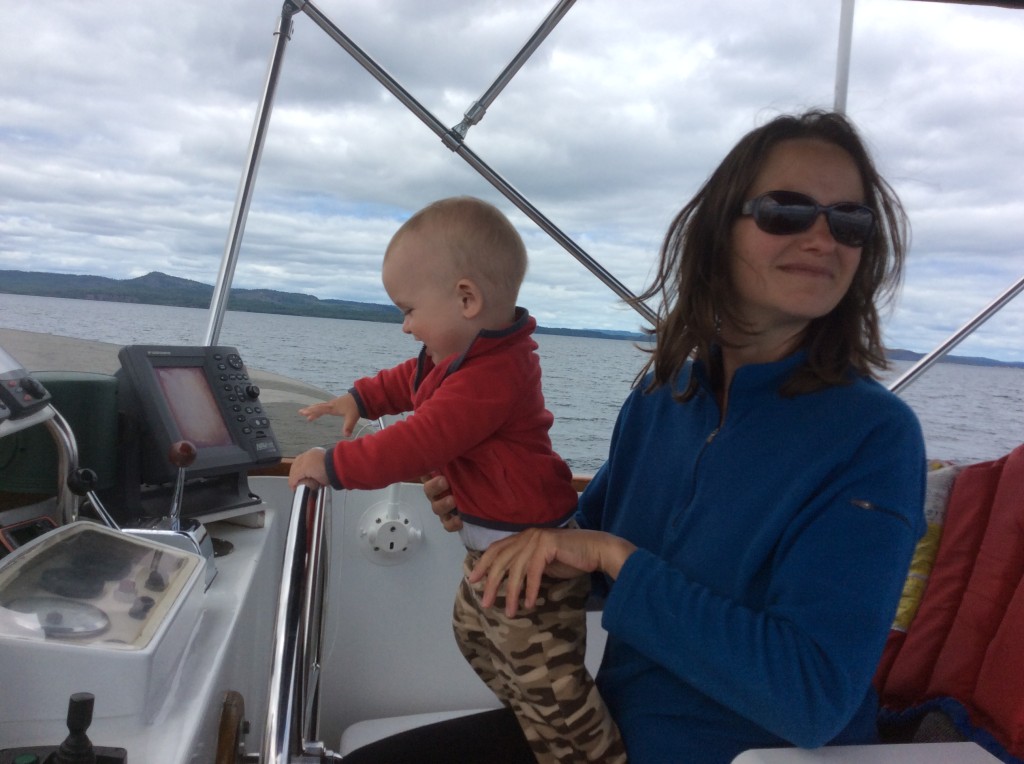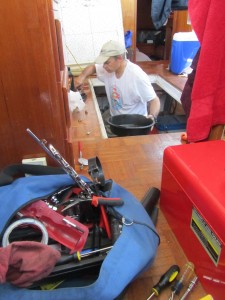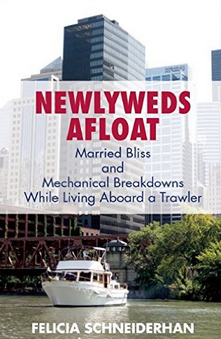
A young woman in the big city meets a fella, they fall in love and get married. It sounds like a familiar formula. But the guy happens to live on a boat. And we’re not talking like the quirky dude who lives on a boat in a movie or television show, the guy who never seems to have to do any work to the boat or is ever actually seen taking it out on the water. Where the boat is symbol for a carefree, exotic existence.
No, Felicia Schniederhan‘s newest memoir, “Newlyweds Afloat: Married Bliss and Mechanical Breakdowns While Living Aboard a Trawler”( Breakaway Books) chronicles all the elbow grease that goes into a life on the water. When she meets her husband-to-be, the writer is a young scribe about town in Chicago living as most city-dwellers do, in a sensible apartment. But as love brings them closer together, the boat becomes home. And, as the memoir attests, it’s not a carefree existence at all. There’s the limited space. The cold winters on the water. The pumps that break. The six-minute showers because of the lack of hot water. The geese attacks. Yes, GEESE ATTACKS.
The result is a fun journey on the sea of marriage throughout all its waves and calm waters. (See an excerpt beneath the interview)
We had a chance to catch up with Schniederhan, who know resides in Duluth, Minnesota with her husband and three children. Schniederhan is also a contributor to our Narrative Map essay series.
What is your background?
I grew up on the Mississippi River. I first met the Great Lakes when I moved to Evanston, IL to go to Northwestern University when I was 18. I was terribly depressed in college and would go on long, wandering walks, usually by the lakefront. The image of a tiny downtown Chicago to the south, and this huge expanse of Lake Michigan in front of me, was very comforting: the city and suburbs weren’t so big; nature was still the boss.
I majored in theater and women’s studies at Northwestern. When I graduated, I had no idea what to do. I took a year to work at a Whole Foods. I was writing a lot. I figured what the hell, let’s go get an MFA in fiction writing (can’t make a living as an actor, why not try being a writer?). Writing was something I always did, from the time I was 11 years old. So I got an MFA at Columbia College Chicago.
Tell us a little about the book and how it came to be?
When I married Mark and moved onboard, I wanted to write about the experience to my dad, who was fascinated by living on a boat. There were a lot of other people, too, who wanted to know about it. So I decided to start a blog. Blogs were rather new at that time (2006). New-ish. I didn’t even have a digital camera, and the first entries had no images to go with them. Just brief excerpts of boat life. (There was no shortage of stuff to write about.) Pretty soon I realized people were reading the blog. Other boaters would talk to me about it. Someone Googled how to pump out their sewage tank, and my blog came up – it’s a point of pride that they learned how to pump out their crap from my blog. Boaters at docks would look at me kind of strange, then admit they read the blog. I realized people knew more about us than I thought.
Around this time, I was working as a freelance writer, pitching articles to editors. As a clip, I would give them the link to the blog. I wasn’t sure how editors would react to blogs, if they were considered legit. But inevitably the editor would come back to me and say, “We don’t want the story idea you pitched us, but can you give us this blog entry…?” So I started writing articles from the blog.
When we moved to land in Northern Minnesota and the experience ended, I realized there was a complete story arc, and a book. So I started honing down the blog – I printed out the whole thing and began editing, shaping, seeing what was missing. I had to write a lot about the beginning of the relationship, since I never blogged about it. And then towards the end, when I was looking at the entire book, I realized there was a really important aspect of that time completely missing – so I wrote “A Boat from Temperance.”

So what’s it like living on a boat?
Fun! Stressful and unnerving, always interesting. It’s a gift to be able to live in nature no matter where you are, even downtown Chicago. It was simpler, in a lot of ways – we had less room, so we couldn’t have as much stuff. Now we’ve got a four-bedroom house and way too many piles.
How is living on a boat more difficult in a big city like Chicago?
Well, I never lived on a boat in a small town, so I don’t have a lot to compare it to. The advantages in Chicago are that there are many harbors to choose from in the summer, and because there are more people overall, there are more people who want to live on their boats year-round (like 10). Year-round liveaboards formed a great community, the “River Rats,” and we would all go to the River City Marina in the winter, since that marina kept their services (water and pump-out) working all year. The River Rats really helped each other out.
In Chicago, there are also a lot more amenities for people on the water – like restaurants you can cruise up to. And boaters are outside the boundaries, in a lot of ways, so we could do things under the radar, like just dock downtown and spend the night, or throw down an anchor in front of the John Hancock building and sleep out.
You have a chapter about geese-attacks. What are some other scary moments you encountered while living on the boat?
My first winter aboard we spent a weekend in the U.P. climbing ice, and when we got back to Chicago we found that the Chicago River had frozen, locking the boat in ice. The experience is detailed in “Surviving Shackleton’s Endurance.” (Which is excerpted below). That was dangerous because the ice could have cracked the hull, or the engine would have frozen, or pipes could have burst. Luckily we were able to get things up and running again within a couple days. But it was a terrifying couple days (and I really wanted to bolt – but I learned to stay).
You talk a little bit in the book about how living on the boat may have caused problems in your marriage, where you were kind of second billing to the boat your husband was fixing up. What other ways did living on the boat affect your blossoming marriage?
Because we were in such close proximity, it was hard to hide anything. Like anybody, I had my own issues that I brought to the marriage, and such tight quarters brought everything out in the open – resulting in really good changes for me. (I write about it in “A Boat from Temperance.”) Living on the boat also taught us how to work together, as partners (which has been great preparation for parenting three small kids).
What are your favorite nautical books or writers that inspired you while working on this project?
I loved Guy de Maupassant’s book about sailing, Afloat. Libby Hill’s book The Chicago River: A Natural and Unnatural History was always really helpful – it was like our neighborhood phone book. And Julie Buckles’s memoir Paddling to Winter is a fascinating story about a different kind of newlywed boat trip – paddling 2,000 miles with her husband Charly from Lake Superior all the way up to the middle of Canada.
What’s next for you? What else are you working on?
I’m working on a novel about elite climbers. Climbing is not something I do well, but I really admire people who have the drive and the ability and the grace to achieve what seems impossible. I’m interested in the emotional lives of climbers, their intimate relationships.
An excerpt from Newlyweds Afloat: “Surviving Shackleton’s Endurance”
When I told people I would be moving aboard my new husband Mark’s boat just after our September 30 wedding, initial reactions ranged from “That’s so romantic,” to “Can you do that in Chicago?” Then they would ask, “What about winter?”
 “We live on the boat,” I would tell them.
“We live on the boat,” I would tell them.
“No, seriously,” they’d say.
I would explain like I knew what I was talking about: “There’s a heater, and Mark rigged up a furnace. It’s insulated, and he wraps the whole top in plastic. There’s a bubbler to keep the water circulating around the boat.”
They would look at me like I was crazy. “This is Chicago,” they would remind me.
I would shrug. “Mark’s done it for two years.”
I started dating Mark during his second winter on board and even spent some January nights on Mazurka. It seemed like he had worked out most of the bugs of a winter aboard, so I felt confident that the freezing Chicago temperatures would not be our biggest challenge in our newlywed year.
But let’s be honest: Before you spend a winter living aboard, you have no idea what you’re signing up for.
In early February we drove to the UP for the annual Ice Fest, a long weekend of cross-country skiing and climbing frozen waterfalls in subzero temperatures.
You have to really love the cold to want to climb ice. It requires putting on several layers of clothing, procuring the necessary gear (harness, crampons, ice axes, a helmet), and hiking out to a frozen waterfall. Walls of ice are unforgiving, and don’t much care how fit you are or how far you drive to climb them—they are cold and foreboding and will stand firm no matter how much ice you chip off in your attempt to scale the wall and conquer it.
We were exhilarated Sunday night, driving back to Chicago, counting down the temperatures (“Now it’s eight below!”). We returned from a weekend climbing ice to find . . . ice. It was something neither of us had ever seen. The Chicago River was completely frozen over, with geese like new penguins sliding around on the interlocking triangles of dark black ice. The River City Marina was solid; ice closed in on Mazurka’s hull so that it resembled Shackleton’s Endurance at the South Pole in 1915.
We opened up the door to find a frigid tomb. Inside, the cabin temperature was twenty-eight degrees—everything was frozen, including all the faucets, pipes, olive oil, shampoo, and contents of the refrigerator. It felt like an abandoned ghost ship, save for Hunter and Leo, their fur puffed up, looking a bit shell-shocked and thirsty—their water dish was a solid block.
I called my ex-husband (I had asked him to watch the cats over the weekend). When he came aboard Saturday afternoon, everything was fine. We deduced that sometime in the previous twenty-four hours, the Mermaid heater had stopped working, probably when the river temperature became so cold that the water inlet froze and the heater could no longer pull in warm water to heat the boat. The Toyoset furnace (which Mark had just begun fueling with kerosene, before solving the diesel issue) roared through the fuel in less than a day and also quit.
“This is my worst nightmare,” Mark said. He started the engine—the quickest way he could think to warm things up. (We never winterized the boat because we always kept it warm; maybe a day more and the engine would have frozen.)
We heard the terrible crack of a pipe breaking; thankfully it was just the drinking water filter under the sink. Expensive, but not dire. We stayed up till 1 a.m., when the cabin temperature had risen to forty-two degrees, then went to bed on an ice-cold mattress over the water tanks, which were probably frozen, too.
While I love climbing frozen waterfalls as much as the next girl, I like it even more when I know at the end of the day, we’re going to hike back to civilization and back to the hotel, where there’s hot soup and coffee and a sauna and whirlpool. Driving eight hours back to Chicago, I was looking forward to a luxurious six-minute shower, some clean clothes, and a warm bed. Instead, we lay down on a block of ice wearing the same three layers of clothing and hats and coats we’d worn all weekend. I tried to be grateful that I had a roof over my head when there were plenty of people sleeping under cardboard. It was all I could do not to break down sobbing.
“I feel like throwing up,” I told my husband in the darkness. He agreed. It was the first time in four months I thought maybe living on Mazurka wasn’t such a great idea.
The next morning we fretted about living aboard without water. We considered which friends we could stay with. Mark said he would stay on Mazurka to make sure she was okay. I wanted to put my cats in the car and drive three hours to my parents’ house till things heated up, but I thought again; I was married now—I would stick by my husband.